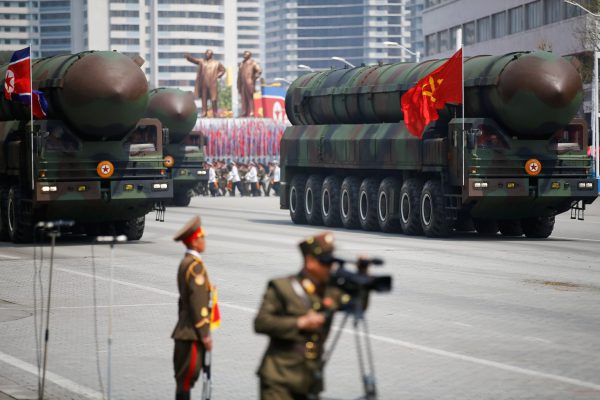The prospect of rolling back the nuclearisation of the Korean Peninsula has progressively faded away.
Since Kim Jong-un inherited power, Pyongyang has conducted four nuclear tests and more than 75 short- to intermediate-range ballistic missile tests. Many believe the missiles tested are intercontinental ballistic missiles capable of striking the US mainland — a significant advance.
The question now is how long Japan and South Korea will maintain their confidence in the US nuclear umbrella before moving to develop their own nuclear deterrence capabilities. Meanwhile, seeking to ratchet up military pressure on North Korea, the United States has conducted air operations over the Korean peninsula. It has also participated in military exercises with South Korea and Japan.
Despite US Secretary of State Rex Tillerson’s ‘four noes’ to reassure North Korea — that the United States will not seek regime change, the collapse of the regime, an accelerated reunification of the peninsula or an excuse to send the US military north of the 38th parallel — many in the United States, including a significant number in Congress, believe the time for negotiation with North Korea is over. President Trump has been called upon to follow through on his ‘maximum pressure’ policy, including pressing China to execute financial blocks and economic embargoes on North Korea.
Whenever tensions between Pyongyang and Washington are rising, so is the risk of miscalculation and inadvertent military confrontation. Trump’s petulant and unpredictable personal character should not be understated in such a tense atmosphere. His provocative ‘fire and fury’ remarks did nothing to deter Pyongyang but instead ratcheted up the tension. US deployment of the THAAD missile defence system in South Korea has not only undermined the strategic deterrence capabilities of both China and Russia, but has also strained relations between Beijing and Seoul.
The brawl over North Korea’s nuclear issue has also made Beijing’s relations with Washington more unpredictable. Washington complains that Beijing, with its unique economic sources of leverage, has fallen short of its obligations to rein in Pyongyang’s misbehaviour. Beijing in return argues that Washington has long failed in its own attempts at risk reduction on the peninsula.
Pyongyang of course must be blamed for violating UN resolutions and is responsible for rising regional tension and instability. But North Korea’s nuclear issue is both the cause and result of the security situation on the Korean peninsula. From Pyongyang’s perspective, developing nuclear weapons provides deterrence against a regime-change attack from the United States and other outside threats.
Pyongyang will never shy away from pressing for more concessions by leveraging its nuclear weapons program, even at the expense of China’s national security interests and overall regional stability. It should also recognise that its persistence in nuclear weapons development has made its prospect of improving the national economy a mission impossible.
To a large extent, the spiralling tensions over the North Korea nuclear issue should also be attributed to Washington’s and Seoul’s continuous flip-flopping on their policies towards Pyongyang, which has damaged their policy credibility. The deficit in strategic collaboration and lack of synchronised efforts among key stakeholders, including China and the United States, have given Pyongyang more opportunity to drive wedges between these states.
These wedges have enabled North Korea to evade pressure from the international community and reduced the efficacy of both carrots and sticks. The entrenched strategic suspicion among key players — particularly between Beijing and Washington — has rendered the supposed international united front against North Korea’s nuclear program fragile and vulnerable.
There is a need for improvement in Beijing’s policy, particularly on sending a stronger message of opposition to Pyongyang’s nuclear weapons and related programs that violate UN resolutions. Beijing’s decision to turn the screws on North Korea this year is the right step forward to ensure Pyongyang pays a higher price for its irresponsible behaviour.
That said, it is Pyongyang and Washington that hold the key to the final solution of the North Korean nuclear crisis. Beijing will likely continue to pursue dual-track approaches in a more forceful way, simultaneously seeking to roll back North Korean nuclearisation and encouraging constructive dialogue between Pyongyang and Washington. But it has also been stepping up its preparation for the worst-case scenario.
Encouraging reconciliation between Washington and Pyongyang, and between Seoul and Pyongyang, is crucial. The challenge is to integrate international pressure so that dialogue with Pyongyang is as clear and credible as possible.
As a first step, Pyongyang and Washington both need to consider the ‘two suspension’ proposal seriously — Pyongyang suspending its nuclear and long-range missile tests, in exchange for the suspension of joint military exercises or other shows of force targeting Pyongyang by Washington and its allies.
Beijing needs to reconsider its quasi-alliance commitment towards Pyongyang, unless North Korea stops its nuclear weapons program and other provocative actions at the cost of China’s vital security interests. Beijing’s message towards Washington should also be clear and stern: China will intervene, including by military means, if the United States and its allies attempt any preeemptive military action against North Korea for regime change. Innovative ideas should be encouraged, including the proposal of a joint security assurance from Beijing, Moscow and Washington to Pyongyang in return for freezing its nuclear weapons program.
Neither single-handed pressure nor fragmented incentives will work. Given the urgency of the crisis, all parties should step up their risk-reduction efforts before it’s too late.
Dongxiao Chen is President of Shanghai Institutes for International Studies. An extended version of this article appeared in the most recent edition of East Asia Forum Quarterly, ‘Japan repositions’.

